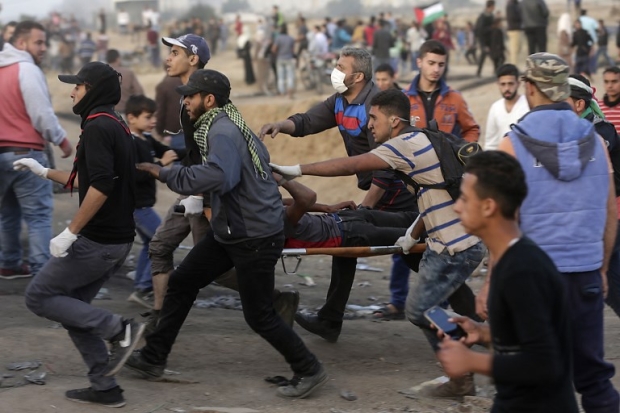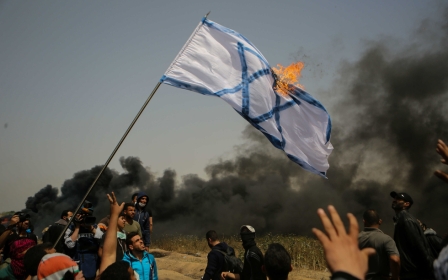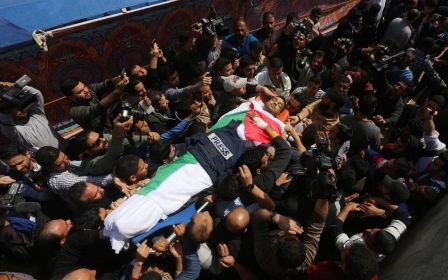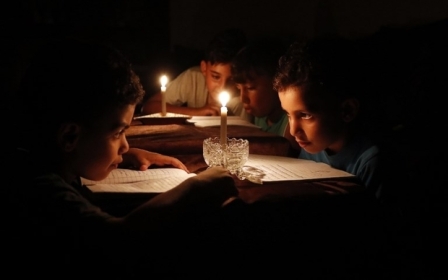Where is Israel's outrage at the appalling massacre in Gaza?
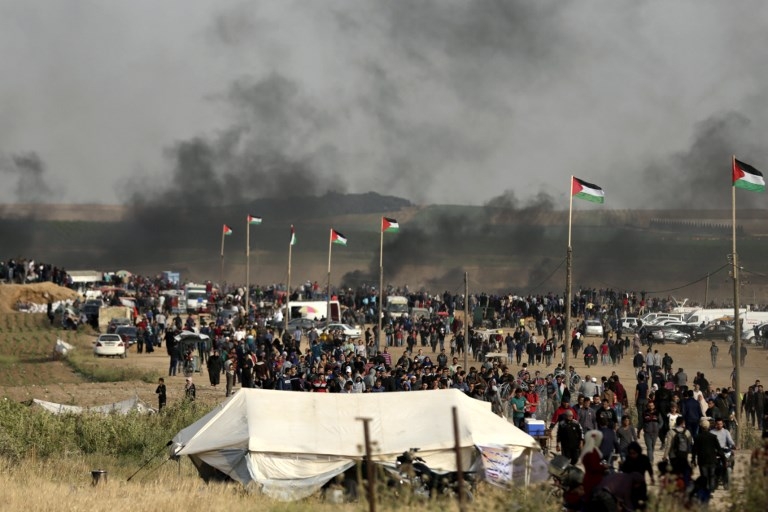
For the last few weeks, Palestinians in Gaza have been marching every Friday towards the Israeli fence, and every Friday, they have been met with live fire from Israeli soldiers. More than 30 Palestinians have been killed and hundreds more wounded since the "Great March of Return" began on 30 March.
The demonstrators were unarmed and did not threaten the lives of the soldiers beyond the fence. What's been happening is a massacre; there's no other word to describe it.
Israel has responded to these events with its typical lack of interest. Only the thick black smoke from burning tyres, which may have drifted towards Israeli communities along the fence, threatened the serenity of their Passover holiday.
No collective sense of horror
The extent of the violence against unarmed civilians, coupled with the fact that Israel has non-lethal options for dealing with demonstrations, has failed to evoke a significant public discussion in Israel.
Even some of the most disturbing footage - such as the clip of a protester rising from his prayers only to be met with a bullet, or the woman holding a flag and nearing the fence and falling to the ground from a sniper's shot - have failed to evoke a collective sense of horror.
When a Palestinian journalist was shot by a sniper despite wearing a vest clearly marked "Press," Israelis were quick to brand him as a "Hamas activist" or a "terrorist with a drone".
Israel cannot now proceed with the routine of denial and repression. It became impossible to go on defending soldiers when they were heard expressing themselves in that manner
Israel remains untroubled by an army that shoots demonstrators and journalists, and is even proud of it, rationalising that these are not innocent protesters but rather terrorists threatening its sovereignty and security. Politicians from across Israel's political spectrum, except the radical left, have competed among themselves to see who could salute the army the most.
And then the media got hold of a short video, just a minute and 24 seconds long. Once again, it showed a blurry image of an unarmed Palestinian approaching the fence, only to be shot by a soldier before falling to the ground. We've already seen other similar videos, and Israel did not get upset. But in this one, there was a soundtrack that made a difference: In the background, soldiers can be heard cursing and expressing overt, vulgar enthusiasm as the unarmed victim falls to the ground.
Israel cannot now proceed with the routine of denial and repression. It became impossible to go on defending soldiers when they were heard expressing themselves in that manner. The contemptible work of Israeli snipers, who aim and fire at protesters, suddenly acquired a repellent soundtrack. Suddenly, it was a scandal.
Media collusion
But even this minor tempest quickly subsided. The army initially tried to shrug off all responsibility for the clip, and then hastened to announce that it was actually from last December - as if this would make the horror of it obsolete.
The media, as usual, swiftly colluded with this denial and repression. Within a day, the clip was forgotten. Defence Minister Avigdor Lieberman, who is among the most extreme, cynical and despicable of Israeli politicians, proclaimed that the sniper should get a citation, but the soldier who filmed him should be demoted. Education Minister Naftali Bennett, leader of the Jewish Home party, rushed to support the soldiers in the clip, as did many other politicians from across the political spectrum.
In truth, Israel should have been horrified a long time ago - long before the first "March of Return" commenced, when it was already clear that soldiers were prepared to shoot protesters with live fire. The Israeli army boasted that "100 snipers" and tanks were waiting for the marchers. A healthy society would have reacted at the outset, forcing them to hold their fire.
Israelis should have been horrified at the first massacre on Land Day, when more than a dozen Palestinians were killed and hundreds more wounded; then at the massive army attacks the following Friday; then at the video clip of the cheering soldiers. But Israeli society has lost its moral compass and is numb to these things.
The case of Ahed Tamimi
A society that does not get agitated at the arrest of Ahed Tamimi - a teenage girl stood bare-handed, facing soldiers who had invaded her backyard, and tried to kick them out as they deserved, after other soldiers shot her cousin in the head a short while earlier - will not be upset by anything.
Ahed's image has become an icon all over the world, and two million people have signed a petition calling for her release. Only in Israel is her fate of no concern to anyone. Ahed remains in prison, and Israel has lost interest. There's no solidarity from Israeli parents of children Ahed's age, and no jurists have come forward to decry the brutality Israel demonstrates in its arrests of minors.
Women's organisations did not step up to oppose the embarrassing arrest of Ahed and her mother, who was also sent to jail for having filmed her daughter slapping a soldier in the face. There was no mass outrage from artists, intellectuals or ordinary citizens living under a regime that jails minors only because they are Palestinians opposed to the occupation. None of that happened when Ahed was arrested, and it most certainly did not happen after those scenes along the Gaza fence.
Two million people live in Gaza, the world's largest open-air prison, victims of a dreadful experiment on human beings. The UN has already said that by 2020, this cage will not be fit for human habitation. It is now 2018, but Israel averts its gaze from Gaza - does not see, does not want to see and is not interested.
Dehumanisation of Palestinians in Gaza
Israelis have become accustomed to thinking that Gaza is a nest of terrorists, and that its residents have no rights whatsoever – that Gazans are actually not human beings. And if Gazans are not human beings, no war crime, disaster or victimisation will evoke even one iota of horror, one glint of moral uncertainty, one gram of human solidarity – and certainly no protest or opposition.
No remnants of a collective conscience remain in Israel insofar as Palestinians are concerned. A long, ongoing, systematic process, led by politicians and generals with the collusion of the Israeli media, is now reaching its peak. Never in memory has there been such extreme cold-heartedness evident in Israel, which already has a very impressive record of cold-heartedness towards Palestinians, from the time of the 1948 Nakba right up to the present day.
In Gaza, the blood of civilians is being shed in vain, and Israel, whose soldiers are shedding that blood, is unmoved
In Gaza, the blood of civilians is being shed in vain, and Israel, whose soldiers are shedding that blood, is unmoved. Certain segments of Israeli society even find this cause for happiness, pride, gratification.
The voices of the soldiers in that repellent video are the voices of a large proportion of Israelis - though not all of them, of course. The soldiers were expressing authentic, if covert, sentiments harboured by a broad segment of the Israeli public, much broader than it would appear. Watch the video and see the Israel of 2018; some of it, anyway.
- Gideon Levy is a Haaretz columnist and a member of the newspaper's editorial board. Levy joined Haaretz in 1982, and spent four years as the newspaper's deputy editor. He was awarded the 2015 Olof Palme human rights prize and was the recipient of the Euro-Med Journalist Prize for 2008; the Leipzig Freedom Prize in 2001; the Israeli Journalists’ Union Prize in 1997; and The Association of Human Rights in Israel Award for 1996. His book, The Punishment of Gaza, was published by Verso in 2010.
The views expressed in this article belong to the author and do not necessarily reflect the editorial policy of Middle East Eye.
Photo: Palestinians gather to protest near the Israeli border fence, east of Gaza City, in the central Gaza Strip on 13 April 2018 (AFP)
This article is available in French on Middle East Eye French edition.
New MEE newsletter: Jerusalem Dispatch
Sign up to get the latest insights and analysis on Israel-Palestine, alongside Turkey Unpacked and other MEE newsletters
Middle East Eye delivers independent and unrivalled coverage and analysis of the Middle East, North Africa and beyond. To learn more about republishing this content and the associated fees, please fill out this form. More about MEE can be found here.



